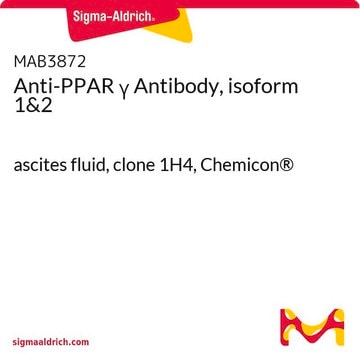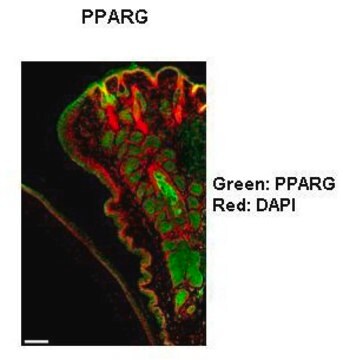ZRB1428
Anti-PPARγ Antibody, clone 1I19 ZooMAb® Rabbit Monoclonal

recombinant, expressed in HEK 293 cells
About This Item
Produtos recomendados
fonte biológica
rabbit
Nível de qualidade
recombinante
expressed in HEK 293 cells
conjugado
unconjugated
forma do anticorpo
purified antibody
tipo de produto de anticorpo
primary antibodies
clone
1I19, recombinant monoclonal
descrição
recombinant, expressed in HEK 293 cells
linha de produto
ZooMAb® learn more
forma
lyophilized
peso molecular
calculated mol wt 57.62 kDa
observed mol wt ~51 kDa
purificado por
using Protein A
reatividade de espécies
mouse, human
reatividade da espécie (prevista por homologia)
canine, monkey
embalagem
antibody small pack of 25 μL
características do produto alternativo mais ecológico
Waste Prevention
Designing Safer Chemicals
Design for Energy Efficiency
Learn more about the Principles of Green Chemistry.
validação aprimorada
recombinant expression
Learn more about Antibody Enhanced Validation
sustainability
Greener Alternative Product
técnica(s)
immunocytochemistry: suitable
immunohistochemistry (formalin-fixed, paraffin-embedded sections): suitable
western blot: suitable
Isotipo
IgG
sequência de epítopo
N-terminal
nº de adesão de ID de proteína
nº de adesão UniProt
categoria alternativa mais ecológica
, Aligned
Condições de expedição
ambient
temperatura de armazenamento
2-8°C
modificação pós-traducional do alvo
unmodified
Categorias relacionadas
Descrição geral
Especificidade
Imunogênio
Aplicação
Evaluated by Western Blotting in PC3 cell lysate.
Western Blotting Analysis: A 1:1,000 dilution of this antibody detected PPAR in PC3 cell lysate.
Tested applications
Immunocytochemistry Analysis: A 1:100 dilution from a representative lot detected PPAR in PC3 cells..
Immunohistochemistry (Paraffin) Analysis: A 1:100 dilution from a representative lot detected PPAR in human placenta tissue sections.
Note: Actual optimal working dilutions must be determined by end user as specimens, and experimental conditions may vary with the end user
Descrição-alvo
forma física
Reconstituição
Armazenamento e estabilidade
Informações legais
Exoneração de responsabilidade
Not finding the right product?
Try our Ferramenta de seleção de produtos.
Código de classe de armazenamento
13 - Non Combustible Solids
Classe de risco de água (WGK)
WGK 1
Ponto de fulgor (°F)
Not applicable
Ponto de fulgor (°C)
Not applicable
Certificados de análise (COA)
Busque Certificados de análise (COA) digitando o Número do Lote do produto. Os números de lote e remessa podem ser encontrados no rótulo de um produto após a palavra “Lot” ou “Batch”.
Já possui este produto?
Encontre a documentação dos produtos que você adquiriu recentemente na biblioteca de documentos.
Nossa equipe de cientistas tem experiência em todas as áreas de pesquisa, incluindo Life Sciences, ciência de materiais, síntese química, cromatografia, química analítica e muitas outras.
Entre em contato com a assistência técnica








